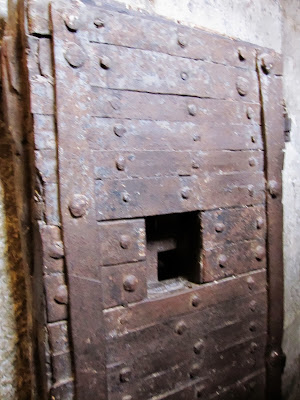In Dan Brown's latest novel, Inferno, Robert Langdon leads readers on another thrilling chase through the streets of Florence and Venice. I've assembled my own photos of some of the locations in the book. (Update: There are more photos from a second trip to Venice in the post Dan Brown's Inferno: More Venice in Photos.)
After completing his quest in the historic centre of Florence, Langdon boards a train bound for Venice, La Serenissima, and arrives at Santa Lucia Station.
A causeway connects Venice with the mainland and the Grand Canal lies directly outside the train station. To the left of the station is the Ponte degli Scalzi, one of four bridges spanning the Grand Canal.
 |
| Ponte degli Scalzi on the Grand Canal |
There are no automobiles in Venice. Visitors must take a water taxi or water bus (vaporetto) from the Ferrovia station to their destination. I've also seen people who chose to walk, but it can be an arduous trek up and down many bridges with luggage.
 |
Ferrovia Vaporetto Station on the Grand Canal
|
Now a symbol of Venice, the Rialto Bridge was the first bridge to span the Grand Canal. Construction was completed in 1591.
 |
| The Rialto Bridge |
The view of the Grand Canal from the Rialto Bridge today resembles a Caneletto landscape painting.
 |
| View of the Grand Canal from the Rialto Bridge |
Langdon sees someone wearing a long beaked plague mask on top of the Rialto Bridge and is reminded of his true purpose for being in Venice.
 |
| Venetian Plague Masks |
He soon arrives at the southern tip of the Grand Canal and Piazza San Marco. When approaching by water, the trees of the Royal Gardens, the Giardetti Reali, are visible along the water's edge.
 |
Giardetti Reali
|
 |
| Approach to Piazza San Marco |
The waters of the Venetian lagoon are frequented by both large cruise ships and much smaller gondolas.
 |
Cruise Ship in Venice
|
 |
| Gondolas on the Lagoon |
The curved shape of a gondola's prow - the ferro di prua - represents the Grand Canal, and the six teeth represent the six sestieres, or districts, of Venice: San Marco, Dorsoduro, Santa Croce, San Polo, Cannaregio and Castello.
 |
| Ferro di Prua, Prow of the Gondola |
From high atop a column the symbol of Venice, the winged lion of St. Mark, greets visitors to Piazza San Marco.
|
|
The Lion, Campanile and Doge's Palace
|
The square's original bell tower, or campanile, collapsed in 1902 but was rebuilt.
 |
| The Campanile |
Across from the campanile is the Palazzo Ducale, or the Palace of the Doges, built of pink and white limestone in the Venetian Gothic style .
 |
| Doge's Palace, Venice |
A wide promenade, the Riva degli Schiavoni, runs along the water's edge from the Doge's Palace to the Arsenal, the shipbuilding yards of Venice.
 |
| Gondolas on the Riva degli Schiavoni |
A stroll along the promenade takes you past the Vitorrio Emmanuel II monument.
 |
| Vittorio Emanuel II Monument |
The Tourist, a 2010 movie starring Johnny Depp and Angelina Jolie, was filmed at the nearby Hotel Danieli.
 |
| Floral Display at the Hotel Danieli |
If you encounter a crowd atop a small bridge, they have stopped to admire Il Ponte dei Sospiri, or the Bridge of Sighs.
 |
Bridge of Sighs
|
The bridge was named by Lord Byron for the sighs of prisoners as they took their last look at freedom, and the beauty of Venice, before being led to the Doge's prison. Giacomo Casanova was the prison's most famous captive - and he managed to escape.
 |
The Doge's Prison
|
Beyond Venice in the lagoon, the island of Murano is famous for its glass blowing factories. The factories were located outside of Venice to protect the population from the dangers of fire, and also to protect the glass makers' secrets.
 |
The Island of Murano
|
 |
The Lighthouse of Murano
|
 |
| The Art of Glass Blowing |
Back at Piazza San Marco, Robert Langdon approaches the basilica of St. Mark's.
 |
Piazzetta di San Marco
|
 |
| St. Mark's Basilica |
Another lion keeps watch from St. Mark's Clock Tower.
 |
St. Mark's Clock Tower
|
 |
| Astronomical Clock |
Beneath the Clock Tower is an archway which leads to the Mercerie, the main shopping street of Venice that runs between Piazza San Marco and the Rialto Bridge.
 |
| Clock Tower Archway |
On the central peak of the basilica, a statue of St. Mark stands over the bronze horses looted from Constantinople during the Crusades. Centuries later, Napoleon sent the horses to Paris to sit on top of the Arc de Triomphe. The original horses are now inside the basilica - the ones outside are copies.
 |
The Domes of St. Mark's
|
 |
Statue of St. Mark
|
 |
The Horses of St. Mark's
|
 |
| The Winged Lion of St. Mark |
From the outdoor cafés on the square, orchestras fill the air with music.
|
|
Orchestra on St. Mark's Square
|
But the image of the plague doctor continues to haunt Langdon.
 |
| The Plague Doctor |
These photos and more can be seen on my Pinterest board Dan Brown's Inferno: Venice.
Related Posts:
Dan Brown's Inferno: More Venice in Photos
Dan Brown's Inferno: Florence in Photos
Dan Brown's Inferno: More Florence in Photos
The Palazzo Vecchio, Florence
Dan Brown's Inferno: The Art




































No comments:
Post a Comment
All comments are moderated.
Note: only a member of this blog may post a comment.